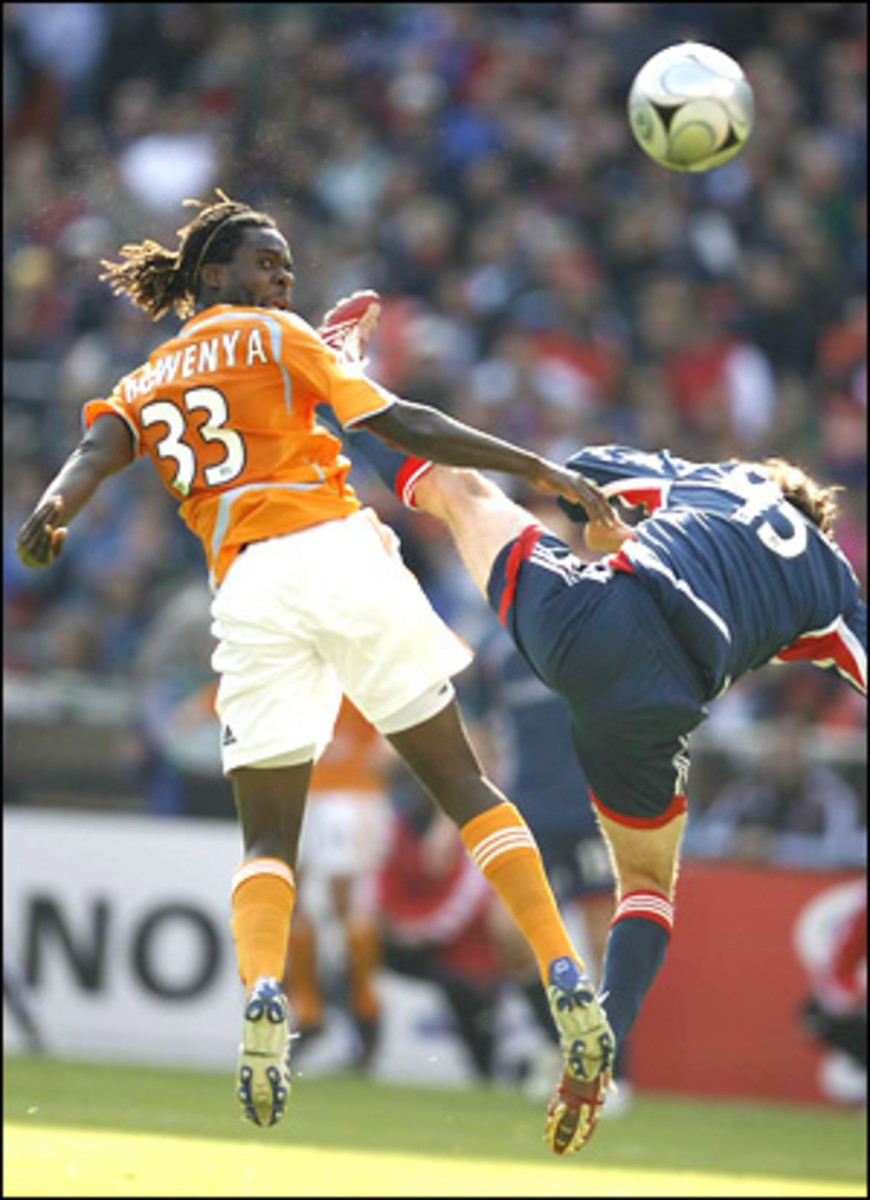
Orange Groove
For a league designed to foster parity, MLS sure has had its share of dynasties. To make the sport financially viable in America, the league's founders opted for soccer socialism, forbidding free agency, pooling their resources and installing a salary cap ($2.1 million per team this season). Instead of an unbalanced collection of haves and have-nots like a European soccer league, all the teams in MLS would essentially be have-littles -- and, in theory, hypercompetitive.
But on-field performance has a way of confounding theories: Two franchises have now combined to win two thirds of the league's 12 championships. On Sunday it was a Rastafarian vegetarian from Canada who made like a defiant Yeltsin-atop-the-tank after the Houston Dynamo's 2-1 victory over the New England Revolution in the MLS Cup final at Washington, D.C.'s RFK Stadium. "In my eyes we've definitely reached dynasty status," said Dynamo midfielder Dwayne De Rosario, whose snapping 74th-minute header gave Houston back-to-back titles and the franchise -- including its previous incarnation as the San Jose Earthquakes -- four in the past seven years. (D.C. United has also won four Cups, the last in 2004.) It was the first time that anyone could remember DeRo's finishing with his noggin. "I can't believe it," marveled midfielder Brad Davis, whose driving cross set up the goal. "It hit his cornrows perfect."
De Rosario's strike followed his assist on Joseph Ngwenya's goal 13 minutes earlier to complete Houston's rally from a 1-0 halftime deficit, bringing yet another year of heartache to the Revs, the Buffalo Bills of MLS, who lost their fourth title game in as many tries. Happily, it also occasioned a revival of DeRo's trademark goal celebration, a sort of Electric Boogaloo ode to 1980s-style pop-and-lock street dancing that serves as a shout-out to his childhood pals on the Malvern Magic, a famed Toronto club team. Born to Guyanese immigrants, De Rosario, 29, grew up playing street soccer with tennis balls and got his first call-up to Canada's national team at age 16. "My roommate was Frank Yallop," he recalls, "and I remember thinking, Who's this old guy?"
Eight years later, after he became the coach of the Earthquakes, Yallop gave De Rosario his first shot in MLS, reviving his career after two fish-out-of-water seasons with FSV Zwickau in the German second division. De Rosario has brought a swashbuckler's panache to MLS -- he owns two of the past four Goals of the Year and blasted the game-winner in the 2001 Cup -- while finishing as a finalist for the league MVP award in '05 and '06. On Sunday he became the only player to win a second MLS Cup MVP trophy. "He tries to do things that maybe other players don't try to do," Dynamo coach Dominic Kinnear said afterward, "and a lot of times it comes off."
Sunday's final was only the latest reminder that MLS is the ultimate Moneyball sports league, a notion reinforced by this season's addition of the so-called Beckham Rule, which gave each team the option to sign one player at any cost (with only $400,000 of his salary counting against the cap). Formally known as the Designated Player rule, the change brought MLS much-needed star power -- the five DPs included the Los Angeles Galaxy's injury-plagued David Beckham, the Chicago Fire's Cuauhtémoc Blanco and the New York Red Bulls' Juan Pablo Ángel -- but it hardly seemed a coincidence that neither of Sunday's finalists used its DP option, focusing instead on building winning chemistry and roster depth.
Then again, why would Houston sign a DP when Las Naranjas (the Oranges, as their Spanish-speaking fans call them) are already drawing boisterous home crowds (exceeding 30,000 twice during the playoffs) and could just as easily offer raises to the players who've earned them? No MLS outfit was deeper than Houston, which won the title despite missing two U.S. national team players, forward Brian Ching (strained calf) and midfielder Ricardo Clark (suspension). "At the end of the day it's about results," said DeRo, who was accompanied by his wife, Brandy, and their three children -- Asha, 10, Osaze, 6, and Adisa, 3 -- at the postgame press conference. "We're a team that didn't have a big superstar making millions, even though a lot of our guys deserve that kind of salary."
Consider: De Rosario earned a guaranteed $325,000 this season. Beckham, meanwhile, made that much every 19 minutes he was on the field. Which one is the richer for it?





